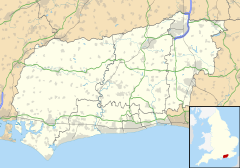Poling, West Sussex
| Poling | |
|---|---|
 St. Nicholas' parish church |
|
| Poling shown within West Sussex | |
| Area | 3.2 km2 (1.2 sq mi) |
| Population | 174 (Civil Parish) |
| • Density | 54/km2 (140/sq mi) |
| OS grid reference | TQ046047 |
| • London | 49 miles (79 km) NNE |
| Civil parish |
|
| District | |
| Shire county | |
| Region | |
| Country | England |
| Sovereign state | United Kingdom |
| Post town | Arundel |
| Postcode district | BN18 |
| Dialling code | 01903 |
| Police | Sussex |
| Fire | West Sussex |
| Ambulance | South East Coast |
| EU Parliament | South East England |
| UK Parliament | |
Poling /pɒlɪŋ/ is a village and civil parish in the Arun District of West Sussex, England, 2 miles (3.2 km) southeast of Arundel on a minor road south of the A27. About 25% of the parish is wooded foothill slopes of the South Downs which is the area north of the A27 here.
The 2001 Census recorded 173 people lived in 75 households, of whom 96 were economically active. At the 2011 Census the population had risen only marginally to 174.
The small village has two Grade I Listed buildings: the Church of England parish church of Saint Nicholas, (in whose churchyard the cricketer Colin Cowdrey is buried), and some remains of St John's Priory (founded by the Knights Hospitallers) beside the main road. Many of the cottages are Grade II listed.
Poling was an agricultural part of the Rape of Bramber, one of the traditional sub-divisions of Sussex and a former Norman barony.
In the Anglo-Saxon era Poling, like most coastal villages, had outlying areas of land in the Weald (forest) within Sussex used for summer grazing and timber production. Thus Poling gave its name to Pallingham north of Stopham and Pallinghurst west of Rudgwick. Poling also had land north of Petworth, then known as "Palinga Schittas", mentioned in a charter of AD 953. in connection with the pannage of pigs to feed on acorns.
...
Wikipedia

